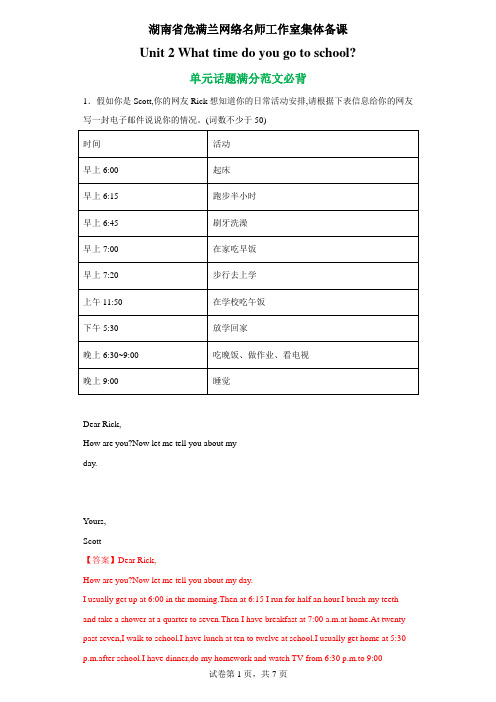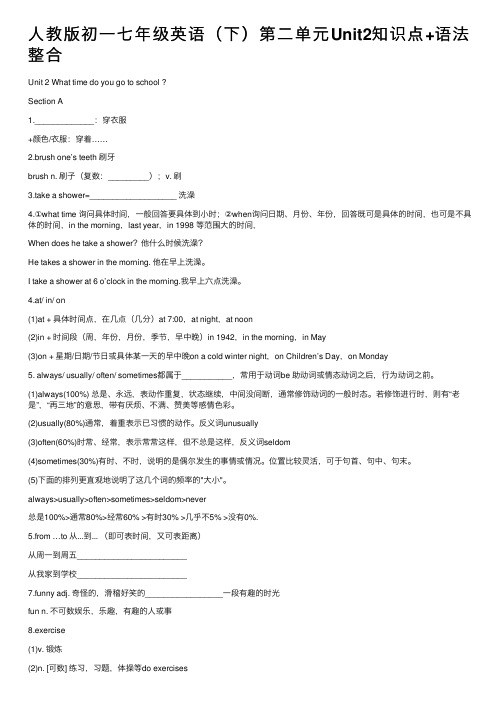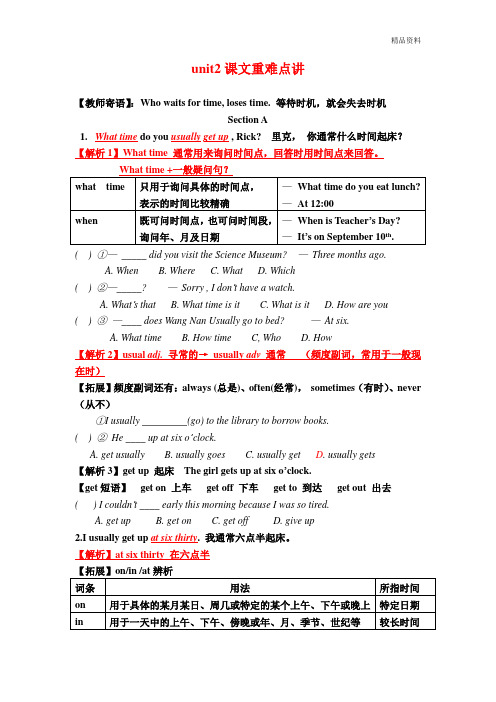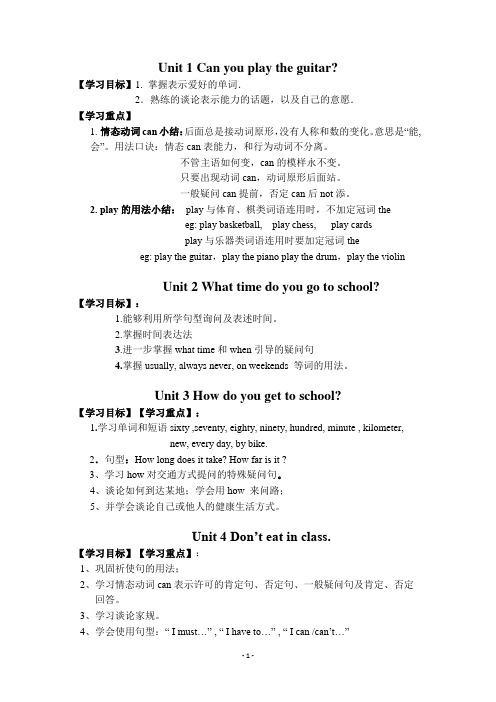人教版七年级英语下册第二单元重点难点汇编
Unit2单元话题满分范文必背20212022学年七年级英语下册单元重难点易错题精练人教版

Unit 2 What time do you go to school?单元话题满分范文必背1.假如你是Scott,你的网友Rick想知道你的日常活动安排,请根据下表信息给你的网友写一封电子邮件说说你的情况。
(词数不少于50)时间活动早上6:00 起床早上6:15 跑步半小时早上6:45 刷牙洗澡早上7:00 在家吃早饭早上7:20 步行去上学上午11:50 在学校吃午饭下午5:30 放学回家晚上6:30~9:00 吃晚饭、做作业、看电视晚上9:00 睡觉Dear Rick,How are you?Now let me tell you about myday._______________________________________________________________________________________________________________________ ____________Yours,Scott【答案】Dear Rick,How are you?Now let me tell you about my day.I usually get up at 6:00 in the morning.Then at 6:15 I run for half an hour.I brush my teeth and take a shower at a quarter to seven.Then I have breakfast at 7:00 a.m.at home.At twenty past seven,I walk to school.I have lunch at ten to twelve at school.I usually get home at 5:30 p.m.after school.I have dinner,do my homework and watch TV from 6:30 p.m.to 9:00p.m.And I go to bed at 9:00 p.m.Yours,Scott【解析】【详解】1. 本文为材料作文,要根据材料,写出要点。
Unit2知识清单++默写版+2023-2024学年人教版七年级英语下册+

人教版七年级下Unit 2 What time do you go to school?基础知识梳理Section A重点单词1.__ ___ v.穿衣服n.连衣裙2. v.刷;刷净n.刷子3. n.&v.淋浴n.淋浴器(间)4. num.四十5. interj.(表示惊奇或敬佩)哇;呀6. adv.& adj.早(的)7. num. 五十8. n.工作;职业9. v. &n.工作10. n.电(视)台;车站11. adv. 表示整点……点钟12. n.晚上;夜晚13. v.&n.锻炼;练习14. adj.最好的adv.最好地;最15. n.组;群16. adv.向上17. n.牙齿(单)→(复数)18. adv.通常地;一般地19. adv.从不;绝不→(反义词) adv.总是20. adj.奇怪的;潜稽好笑的→n.乐趣;快乐重点短语1.起床;站起2.穿上衣服3.刷牙4.洗淋浴5.广播电台6.广播节目7.在晚上8.去上班去上学9.上班迟到10. (在)周末11.在上学日重点句型1.2.3.4.5. ——6.7.8.9. 你通常什么时候洗淋浴?我通常六点四十分洗淋浴。
斯科特有一份有趣的工作。
那个时间吃早饭真有意思哟!“里克什么时候吃早饭?”“他七点钟吃早饭。
”斯科特什么时候去上班?你的广播节目在几点?从夜里12点整到早上6点整。
我上班从不迟到。
Section B重点单词1. 一半;半数pron,n._________2. 一刻钟;四分之一n._________ 3.跑;奔v._________4.打扫;弄干净v.干净的adj._________ 5.或者conj.也adv._________6.大量;许多pron._________7.品尝v.味道;滋味n._________ 8.晚于prep.过去的adj._________ 9.家庭作业n._________10.行走;步行n.&v._________ 11.很快地adv._________12.生活;生命n._________13.有时adv._________★写出下列单词变形_________1.half-(复数)_________2.quickly(副词)-(形容词)_______ 3.life-(复数)_________4.one-(序数词)_________5. quarter-_(复数)_________ 6.healthy-______(反义词)-(名词)_______7.run-(现在分词)________te-(反义词)_________重点短语★根据汉语提示默写出下列短语1.回家__________________________ 2.做作业__________________________ 3.吃晚饭__________________________ 4.上床睡觉_________________________ 5.做运动_________________________ 6.一个健康的生活__________________ 7.散步;走一走____________________ 8.从学校回到家____________________ 9.去鲍勃家____________________ 10.打扫某人的房间__________________ 11.半个小时____________________12.到家____________________13.大量;许多____________________ 14.对...有好处____________________ 15.尝起来味道好____________________ 16.在下午三点一刻__________________ 17.要么...要么...;或者...或者...____________________18.在晚上差一刻七点_________________ 19.在早晨六点半__________________重点句子★根据汉语提示默写出下列句子1.在晚上,我要么看电视要么玩电脑游戏。
人教版初一七年级英语(下)第二单元Unit2知识点+语法整合

⼈教版初⼀七年级英语(下)第⼆单元Unit2知识点+语法整合Unit 2 What time do you go to school ?Section A1._____________:穿⾐服+颜⾊/⾐服:穿着……2.brush one’s teeth 刷⽛brush n. 刷⼦(复数:_________);v. 刷3.take a shower=___________________ 洗澡4.①what time 询问具体时间,⼀般回答要具体到⼩时;②when询问⽇期、⽉份、年份,回答既可是具体的时间,也可是不具体的时间,in the morning,last year,in 1998 等范围⼤的时间,When does he take a shower?他什么时候洗澡?He takes a shower in the morning. 他在早上洗澡。
I take a shower at 6 o’clock in the morning.我早上六点洗澡。
4.at/ in/ on(1)at + 具体时间点,在⼏点(⼏分)at 7:00,at night,at noon(2)in + 时间段(周,年份,⽉份,季节,早中晚)in 1942,in the morning,in May(3)on + 星期/⽇期/节⽇或具体某⼀天的早中晚on a cold winter night,on Children’s Day,on Monday5. always/ usually/ often/ sometimes都属于___________,常⽤于动词be 助动词或情态动词之后,⾏为动词之前。
(1)always(100%) 总是、永远,表动作重复,状态继续,中间没间断,通常修饰动词的⼀般时态。
若修饰进⾏时,则有“⽼是”,“再三地”的意思,带有厌烦、不满、赞美等感情⾊彩。
(2)usually(80%)通常,着重表⽰已习惯的动作。
人教版七年级英语下册第二单元重点难点

Unit2Where’sthepostoffice一.Askingways:(问路)1.Whereis(thenearest)……?(最近的)……在哪里?2.Canyoutellmethewayto……?你能告诉我去……的路吗?3.HowcanIgetto……?我怎样到达……呢?4.Isthere……nearhere/intheneighborhood附近有……吗?5.Whichisthewayto……?哪条是去……的路?二.Showingtheways:(指路)1.Gostraightdown/alongthisstreet.沿着这条街一直走。
2.Turnleftatthesecondturning.在第二个路口向左转。
3.Youwillfinditonyourright.你会在你右手边发现它。
4.Itisaboutonehundredmetresfromhere.离这里大约一百米远。
5.You’dbettertakeabus.你最好坐公交车去。
(You’dbetter+动词原形)三.词组1.acrossfrom……在……的对面acrossfromthebank在银行的对面2.nextto……紧靠……nexttothesupermarket紧靠超市3.between……and……在……和……之间betweentheparkandthezoo在公园和动物园之间among表示位于三者或三者以上之间4.infrontof……在……前面Thereisatreeinfrontoftheclassroom.课室前面有棵树。
inthefrontof……在……(内)的前部Thereisadeskinthefrontoftheclassroom.课室内的前部有张桌子。
5.behind……在……后面behindmyhouse在我家后面6.turnleft/right向左/右拐ontheleft/rightof……在某物的左/右边ontheleftofourschool在我们学校的左边onone’sleft/right在某人的左/右边onmyleft在我左边7.gostraight一直走8.down/along……沿着……(街道)down/alongCenterStreet沿着中央街9.intheneighborhood=nearhere在附近10welcometo……欢迎来到……11.take/haveawalk散步12.thebeginningof…………的开始,前端atthebeginningof……在……的开始,前端inthebeginning起初,一开始13.havefun=haveagoodtime=enjoyoneself玩得开心,过得愉快14.haveagoodtrip旅途愉快15.takeataxi坐出租车16.到达:getto+地方reach+地方arrivein+大地方IarriveinBeijing.arriveat+小地方Iarriveatthebank.17.goacross从物体表面横过goacrossthestreet横过马路gothrough从空间穿过gothroughtheforest穿过树林18.on+街道的名称。
新人教版七年级英语下册unit2课文重难点讲

unit2课文重难点讲【教师寄语】:Who waits for time, loses time. 等待时机,就会失去时机Section A1.What time do you usually get up , Rick? 里克,你通常什么时间起床?【解析1】What time 通常用来询问时间点,回答时用时间点来回答。
What time +一般疑问句?what time 只用于询问具体的时间点,表示的时间比较精确—What time do you eat lunch? —At 12:00when 既可问时间点,也可问时间段,询问年、月及日期—When is Teacher’s Day? —It’s on September 10th.( ) ①—_____ did you visit the Science Museum? —Three months ago.A. WhenB. WhereC. WhatD. Which( ) ②—_____? —Sorry , I don’t have a watch.A. What’s thatB. What time is itC. What is itD. How are you ( ) ③—____ does Wang Nan Usually go to bed? —At six.A. What timeB. How time C, Who D. How【解析2】usual adj.寻常的→usually adv通常(频度副词,常用于一般现在时)【拓展】频度副词还有:always (总是)、often(经常),sometimes(有时)、never (从不)①I usually _________(go) to the library to borrow books.( )②He ____ up at six o’clock.A. get usuallyB. usually goesC. usually getD. usually gets【解析3】get up 起床The girl gets up at six o’clock.【get短语】get on 上车get off 下车get to 到达get out 出去( ) I couldn’t ____ early this morning because I was so tired.A. get upB. get onC. get offD. give up2.I usually get up at six thirty. 我通常六点半起床。
七年级下册英语人教版全册每单元学习目标和重难点

Unit 1Can you play the guitar?【学习目标】1. 掌握表示爱好的单词.2.熟练的谈论表示能力的话题,以及自己的意愿.【学习重点】1.情态动词can小结:后面总是接动词原形,没有人称和数的变化。
意思是“能,会”。
用法口诀:情态can表能力,和行为动词不分离。
不管主语如何变,can的模样永不变。
只要出现动词can,动词原形后面站。
一般疑问can提前,否定can后not添。
2. play的用法小结:play与体育、棋类词语连用时,不加定冠词theeg: play basketball, play chess, play cardsplay与乐器类词语连用时要加定冠词theeg: play the guitar,play the piano play the drum,play the violinUnit 2 What time do you go to school?【学习目标】:1.能够利用所学句型询问及表述时间。
2.掌握时间表达法3.进一步掌握what time和when引导的疑问句4.掌握usually, always never, on weekends 等词的用法。
Unit 3 How do you get to school?【学习目标】【学习重点】:1.学习单词和短语sixty ,seventy, eighty, ninety, hundred,minute , kilometer, new, every day, by bike.2.句型:How long does it take? How far is it ?3、学习how对交通方式提问的特殊疑问句。
4、谈论如何到达某地;学会用how 来问路;5、并学会谈论自己或他人的健康生活方式。
Unit 4 Don’t eat in class.【学习目标】【学习重点】:1、巩固祈使句的用法;2、学习情态动词can表示许可的肯定句、否定句、一般疑问句及肯定、否定回答。
最全面人教版七年级下册英语第二单元知识点归纳总结
人教版七年级下册英语Unit 2 知识点总结Unit 2 What time do you go to school?一、词汇与短语◆重点单词A部分1.up 向上adv.2.fifty 五十num.3.dress穿衣服v. 连衣裙n.4.job 工作;职业n.5.brush 刷;刷净v. 刷子n.6.work 工作n. & v.7.tooth 牙齿n.8.station 电(视)台;车站n. 9.shower 淋浴n. & v. 淋浴器(间)n.10.o'clock (表示整点)点钟adv. 11.usually 通常地;一般地adv.12.night 晚上;夜晚n.13.forty 四十num.14.funny 奇怪的; 滑稽好笑的adj. 15.wow 哇;呀interj.16.exercise 锻炼; 练习n. & v. 17.never 从不; 绝不adv.18.best 最好的adj. 最(好地) adv. 19.early 早(的) adv. & adj.20.group 组; 群n.B部分1.half 一半;半数n. & pron.2.past 晚于;过(时间) prep. 过去的adj. 3.quarter ―刻钟;四分之一n.4.homework 家庭作业n.5.run 跑;奔v.6.walk 行走;步行n. & v.7.clean 打扫;弄干净v. 干净的adj.8.quickly 很快地adv.9.either 或者conj. 也adv.10.life 生活;生命n.11.lot 大量;许多pron.12.sometimes 有时adv.13.taste 有…的味道;品尝v. 味道;滋味n.◆重点短语A部分1.eat breakfast 吃早餐2.get up 起床;站起3.at six forty 在六点四十4.take a shower 洗淋浴5.what time 什么时间6.on weekends (在)周末7.brush teeth 刷牙8.radio show 广播节目9.get dressed 穿上衣服10.after that 然后11.go to school 去上学12.radio station 广播电台B部分1.go home 回家2.go to Bob's home 去鲍勃家3.do (one's) homework 做作业4.clean sb.'s room 打扫某人的房间5.eat dinner 吃晚饭6.half an hour 半个小时7.go to bed 上床睡觉8.get home 到家9.play/do sports 做运动10.lots of 大量;许多11.a healthy life 一个健康的生活12.be good for 对…有好处13.take a walk 散步;走一走14.taste good 尝起来味道好15.get home from school 从学校回到家16.at a quarter past three in the afternoon 在下午三点一刻17.either…or…要么…要么…; 或者…或者…18.at a quarter to seven in the evening 在晚上差一刻七点19.at half past six in the morning 在早晨六点半◆重点句子A部分1.—What time do you usually get up,Rick? 里克,你通常几点起床?—I usually get up at six thirty. 我通常6:30起床。
人教版七年级英语下册第二单元知识点总结
千里之行,始于足下。
人教版七年级英语下册第二单元知识点总结第二单元主要介绍了以下知识点:1. 一般现在时:表示经常性、习惯性的动作或状态。
句型结构为:主语 + 动词原形 + 其他。
如:She often goes to the park on Sundays.2. 一般现在时的否定句:在句子前加上助动词do或does,并在动词原形前加上not。
如:He doesn't play soccer on weekends.3. 一般现在时的疑问句:将助动词do或does提前到句首。
如:Do you like apples?4. 频率副词:表示动作发生的频率,如always, sometimes, often, usually, never等。
如:He often plays basketball in the evening.5. 时间状语从句:用于表示时间的从句,如when, while, before, after, as soon as等。
如:She will call you back when she arrives home.6. 特殊疑问句:以特殊疑问词开头的疑问句,如what, where, how, why 等。
如:Where do you live?7. there be句型:用来描述存在或发生的情况。
句型结构为:there + be动词 + 主语 + 其他。
如:There is a book on the desk.8. there be句型的否定句:在be动词前加上not。
如:There isn't a cat in the room.第1页/共2页锲而不舍,金石可镂。
9. there be句型的疑问句:将be动词提到句首。
如:Is there a park near your house?希望以上总结对您有所帮助!。
人教版七年级英语下册第二单元知识点汇总
Unit 2 What time do you go to school?child – children (pl.) 孩子tooth – teeth (pl.) 牙齿go to work 上班(反义词go home)go to bed 睡觉(反义词get up)短语句子what time 几点钟get up 起床get home到达家中go to class上课go to school 上学come back 回来get dressde穿衣服brush teeth刷牙get/be dressed in+衣服名词或颜色名词表示穿着…衣服或…颜色的衣服be in+颜色(穿戴…颜色衣服/帽子) dress sb.给某人穿衣dress oneself某人自己穿衣服put on 穿上(反义词take off)do one’s homework 做家庭作业have an interesting job 有一份有趣的工作talk about yourself谈论你自己work at the radio station 在电台工作your radio show 你的广播节目make breakfast做早饭eat quickly 吃得快eat vegetables 吃蔬菜eat breakfast =have breakfast/dinner/lunch 吃早、晚、午饭have sth. for breakfast / lunch / dinner 早/ 午 / 晚饭吃…..take a shower = have a shower 洗淋浴澡(have a show演出)make a shower schedule 做一个洗澡的安排from…to …从……到……be never late for work 上班从来不迟到be late for school=go to school late上学迟到了six thirty=half past six六点半 a quarter past three 三点一刻 a quarter to seven 六点四十五half an hour=a half hour 半小时around six o’clock 六点左右take a walk=have a walk=go for a walk 散步go out for a walk出去散步lots of= a lot of = much= many 大量,许多either…or…或者…或者good/well(好)→better较好→best最好sometimes= at times 有时tell sb. about sth. 告诉某人某事know about sth. 知道某方面的情况love to do =like to do 喜欢干某事watch the early morning news on TV 看电视早间新闻in the morning/ afternoon/evening在早上/下午/在晚上in the day在白天at night 在夜间on school nights在上学的晚上on school days在上学期间exercise on weekends 周末锻炼take / get exercise 运动/ 锻炼 do morning exercises 做早操visit / see your uncle 看望你的叔叔do eye exercises 做眼保健操do English exercises 做英语练习keep healthy / be healthy / stay healthy / keep in good health 保持健康What do you do ? =What are you ? =What’syour job ? 你是干什么的?get up early 起得很早 a quarter past three in the afternoon 下午3 点15分go home early 早点回家clean up the room 打扫干净房间clean the room 打扫房间clean my room 打扫我的房间play sports 做运动 do your homework first 先做作业listen to 听… listen to the early morning news on radio 听电台早间新闻 have much time for breakfast 没有很多时间吃早饭don’tplay basketball for half an hour 打半个小时的篮球either watch TV or play computer games 要么看电视要么玩电脑游戏eat a good breakfast 吃一顿丰盛的早餐eat lots of fruit and vegetables for lunch 午饭吃许多水果和蔬菜be good for your health 对你的健康有好处taste good味道很好have a very healthy life有一个健康的生活healthy activities 健康的活动unhealthy habits 不健康的习惯1.英语时间的表达(1)整点时间可表示为“钟点数+o’clock”或直接读钟点数,省去o’clock。
人教七年级下册英语unit2知识点总结
人教七年级下册英语unit2知识点总结Unit 2知识点总结Unit 2主要介绍了有关学校和课程的相关话题,包括学科名称、教室设施、课程时间和日常学习及校外活动等内容,下面我们来一一进行总结。
一、学科名称1. 英语 - English2. 数学 - Math3. 历史 - History4. 科学 - Science5. 美术 - Art6. 音乐 - Music7. 体育 - P.E.8. 计算机 - Computer Science二、教室设施1. 黑板 - blackboard2. 白板 - whiteboard3. 投影仪 - projector4. 音响 - sound system5. 地图 - map6. 水龙头 - tap7. 电视 - TV8. 电脑 - computer9. 灯 - light10. 窗户 - window三、课程时间1. 上午 - in the morning2. 下午 - in the afternoon3. 晚上 - in the evening4. 早上 - in the early morning5. 夜晚 - at night6. 每周 - every week7. 每天 - every day8. 周末 - on weekends四、日常学习1. 做作业 - do homework2. 练习 - practice3. 复习 - review4. 读书 - read books5. 写作 - write compositions6. 讨论 - have discussions7. 板书笔记 - take notes8. 教师讲解 - teacher's explanation9. 学习笔记 - study notes10. 做练习 - do exercises五、校外活动1. 课外活动 - extracurricular activities2. 运动会 - sports meeting3. 聚会 - party4. 社交活动 - social activities5. 英语角 - English corner6. 爱好小组 - hobby group7. 社团活动 - club activities8. 学校之旅 - school trip以上就是Unit 2的主要内容,希望能够帮助大家更好地学习英语,更好地了解学校和课程的相关话题。
- 1、下载文档前请自行甄别文档内容的完整性,平台不提供额外的编辑、内容补充、找答案等附加服务。
- 2、"仅部分预览"的文档,不可在线预览部分如存在完整性等问题,可反馈申请退款(可完整预览的文档不适用该条件!)。
- 3、如文档侵犯您的权益,请联系客服反馈,我们会尽快为您处理(人工客服工作时间:9:00-18:30)。
Unit 2 Where’s the post office一.Asking ways: (问路)1.Where is (the nearest) ……?(最近的)……在哪里?2.Can you tell me the way to ……?你能告诉我去……的路吗?3.How can I get to ……?我怎样到达……呢?4.Is there ……near here / in the neighborhood? 附近有……吗?5.Which is the way to ……?哪条是去……的路?二.Showing the ways: (指路)1. Go straight down / along this street. 沿着这条街一直走。
2. Turn left at the second turning. 在第二个路口向左转。
3. You will find it on your right. 你会在你右手边发现它。
4. It is about one hundred metres from here. 离这里大约一百米远。
5. You’d better take a bus. 你最好坐公交车去。
(You’d better+动词原形)三.词组1. across from ……在……的对面across from the bank 在银行的对面2. next to……紧靠……next to the supermarket 紧靠超市3. between……and……在……和……之间between the park and the zoo 在公园和动物园之间among 表示位于三者或三者以上之间4. in front of……在……前面There is a tree in front of the classroom. 课室前面有棵树。
in the front of……在……(内)的前部There is a desk in the front of the classroom. 课室内的前部有张桌子。
5. behind……在……后面behind my house 在我家后面6. turn left/ right 向左/右拐on the left/right of……在某物的左/右边on the left of our school 在我们学校的左边on one’s left/right 在某人的左/右边on my left 在我左边7. go straight 一直走8. down /along……沿着……(街道)down/along Center Street 沿着中央街9. in the neighborhood=near here 在附近10 welcome to……欢迎来到……11. take /have a walk 散步12. the beginning of…………的开始,前端at the beginning of……在……的开始,前端in the beginning 起初,一开始13. have fun=have a good time=enjoy oneself 玩得开心,过得愉快14. have a good trip 旅途愉快15. take a taxi 坐出租车16. 到达:get to +地方reach +地方arrive in +大地方I arrive in Beijing.arrive at +小地方I arrive at the bank.17.go across 从物体表面横过go across the street 横过马路go through 从空间穿过go through the forest 穿过树林18.on + 街道的名称。
Eg: on Center Streetat + 具体门牌号+街道的名称Eg: at 6 Center Street三.重难点解析1.enjoy doing sth 享受做某事的乐趣,喜爱做某事I enjoy reading. 我喜爱读书。
到目前为止,我们学了两个特殊的动词finish和enjoy,都是要带doing.2.hope to do sth 希望做某事I hope to pass this exam. 我希望通过这次考试。
hope +从句I hope tomorrow will be fine. 我希望明天将会晴朗。
(从句即是一个小句子,这个小句子又放在大句子中,从属于大句子,所以叫从句。
如tomorrow will be fine是一个从句,它又放在I hope 的后面,形成句中有句。
)3. if 引导一个表示假设的句子。
If I have much money, I will go to the moon. 如果我有许多钱,我就会去月球。
If you are hungry, you can buy some food in the supermarket.如果你饿了的话,你可以在超市买一些食物。
七年级英语下册第2单元测试题一、选择填空。
(30分).( ) 1. My best friend sits next ____ me. A. in B. on C. to D. behind( ) 2. Go the bridge, and you can see a big park.A. acrossB. throughC. crossD. across from( ) 3. In England traffic (车辆) goes ____ the road.A. in the middle ofB. on the right ofC. on the left ofD. on the front of( ) 4. The supermarket is _____ Fifth Avenue. A. on B. through C. between D. / ( ) 5. The library is _____ the restaurant and the supermarket.A. nextB. nearC. betweenD. across( ) 6. --- Where are you ______? --- Beijing.A. onB. fromC. comeD. come from( ) 7. Is _____ a pay phone in the neighborhood? A. this B. there C. that D. the ( ) 8. --- _____ can I get to the post office? ---Go down this road and turn left.A. WhereB. WhatC. HowD. When( ) 9. --- Is there a supermarket? --- No, _____.A. this is notB. there isn’tC. it isn’tD. there aren’t( ) 10. There isn’t _____ clean park. A. the B. a C. an D. /( ) 11. This is a nice city ______ many interesting places. A. of B. with C. on D. and ( ) 12. Bridge Street is a good place _______.A. have funB. to have funC. having funD. to fun( )13. --- Is there a pay phone _______ the neighborhood?--- Yes, it’s____Center Street____the right.A. in, down, onB. on, on, isC. in, on, isD. on, down, on( ) 14. Can you tell me the way ______ the post office? A. to B. on C. at D. of ( ) 15. You can get money in the ______ and you can get books in the ______.A. post office, bankB. bank, gardenC. bank, libraryD. library, bank( ) 16. How can he ______ the new school?A. gets toB. get toC. arriveD. arrive to( ) 17. I hope I can have a big house ______ a beautiful garden. A. in B. for C. at D. with ( ) 18. Jim often arrives _______ school at 8:00. A. in B. at C. to D. of( ) 19. My house is _______ the shop. A. to B. through C. across from D. pass ( ) 20.There ____ a pen and two pencils in the pencil case. A. is B. are C. be D. have ( ) 21.Look! Your father is ______ two men. A. among B. in C. between D. of( ) 22.Liu Mei is short. So she sits _____ the class.A. in front ofB. in the front ofC. at the back ofD. behind( ) 23.______. Can you tell me the way to the library?A. SorryB. ExcuseC. I’m sorryD. Excuse me( ) 24.-How many people are there in your ______? -Three, my parents and I.A. houseB. homeC. familyD. room( ) 25.Go straight and turn _____. You’ll see the school.A. to leftB. the leftC. for the leftD. left( ) 26.Jim sits _____ my left. A. in B. on C. for D. of( ) 27.Children like reading books _____ pictures. A. with B. for C. of D. at ( ) 28.There is a bridge ______ the river. A. cross B. across C. over D. through( ) 29. —there orange juice in the fridge? —I don’t know.A. AmB. AreC. IsD. Does( ) 30. —Welcome to our garden district. —____.A. SureB. Not badC. Not at allD. Thank you( ) 31. It’s _____ to cross the streets in the morning and in the evening.A. dangerousB. easyC. interestingD. safe( ) 32. You can see the city well on the _____ floor of the bus.A. firstB. secondC. thirdD. fourth四.用所给词适当形式填空。
